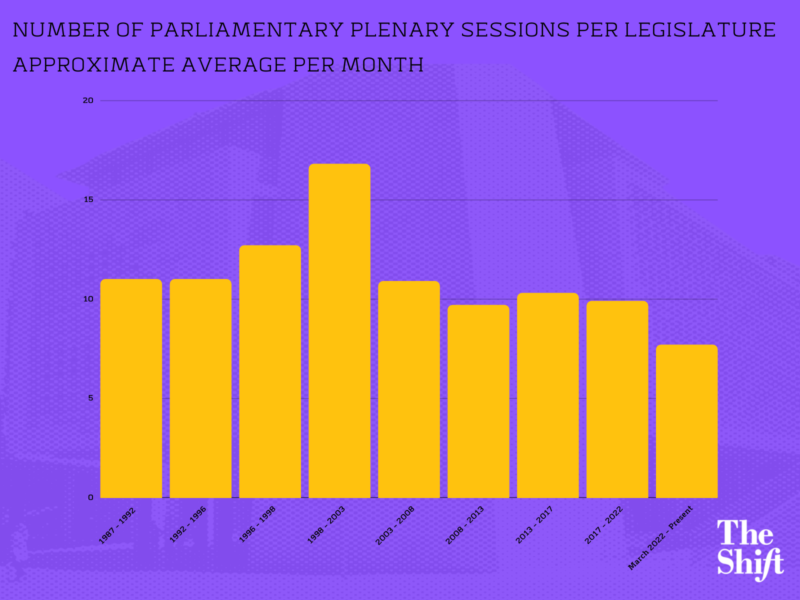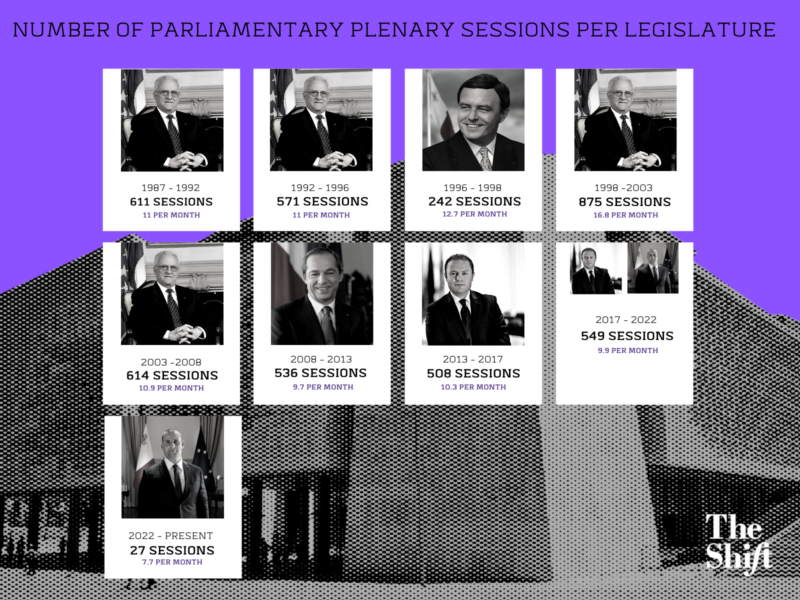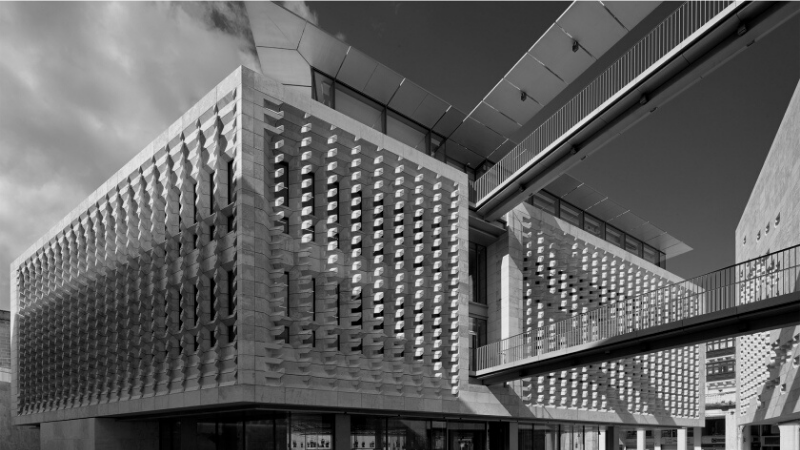Parliament’s 14th legislature, which started in May with Robert Abela as prime minister, has to date only convened in plenary 26 times.
After a three-month hiatus, it will reconvene again on 3 October. If we get the sense our House of Representatives has not been up to much between the general elections in March and the summer recess, it’s because it hasn’t.
The March general elections made this year particularly disruptive, but it is still indicative of the issues of having a part time parliament. Issues that numerous international organisations have drawn attention to and have repeatedly asked the government to address.
According to the last periodical published on the parliament’s website, between June 2017 and December 2020, 412 plenary sittings were held.
Excluding the work of the various parliamentary committees, that would amount to approximately 10 plenary sittings a month, and with sessions starting at various times of the day, including in the afternoon and evening, few sessions take up more than half a day.
Add the time allocated to parliamentary speeches to an already condensed schedule, and the legislative progress is slowed further.
A cursory analysis of all the plenary sessions during the last six legislatures, between 1987 to date, shows that this approximation doesn’t change dramatically over the years, except for the 9th legislature (1998 – 2003) with Eddie Fenech Adami as prime minister, which averaged close to 17 plenary sessions per month.

Average number of parliamentary plenary sessions per month.
How do they do it?
During the July debate in the European Parliament, following the presentation of the Civil Liberties, Justice and Home Affairs (LIBE) Committee’s report on its mission to Malta to the European Parliament, Dutch MEP Sophie, in’t Veld questioned Malta’s ability to implement legislative reforms and transpose EU legislation. Her observation was echoed in the committee’s final report.
Throughout its mission, the Committee also noticed the “slow progress in the follow up” to the assassination of journalist Daphne Caruana Galizia, specifically referring to the process of implementation of the recommendations by the public inquiry.
They also reiterated the “urgent need” to quicken the pace of necessary legislative reforms, echoing the concerns they had voiced in a press conference held in Malta following their mission.
An even more detailed breakdown of the issues inherent to a part time parliament is outlined by the Council of Europe’s draft resolution that was approved in June, which called for the “far-reaching reform” of Malta’s parliament.
The resolution describes how the position of part time MPs “limits the time MPs have available for legislative work and control of the government,” thus weakening the parliament and leaving it struggling to provide proper parliamentary oversight over the executive.
It also noted how in Malta, having part time MPs reduces the time they have available to prepare for debates and draft legislation. It also makes MPs vulnerable to conflicts of interest and corruption since they must be “in gainful employment next to their job as parliamentarians”, adding that it’s not just Malta’s parliament but the country’s entire system of governance that is susceptible to conflicts of interest and corruption.
In the Council of Europe’s view, establishing a full time parliament will ensure the proper functioning of the democratic institutions and system of governance in Malta.

The average number of parliamentary plenary sessions per month. Source: parlament.mt
It’s not just parliament that’s adversely affected
It’s not just international organisations that are recommending a full time parliament. In 2019 and 2020, the Commissioner for Standards in Public Life also recommended that MPs be given the choice to work as full timers (with the right of reversion to their jobs in the public sector if they step down from parliament or are not re-elected).
The Standards Commissioner made these recommendations following an investigation where he found that the rules whereby members of parliament in public sector employment can be released from work to attend parliamentary activities were being abused.
The fact that this abuse is tolerated by government entities represents a lack of good governance, the Commissioner concluded.
According to the rules for public employees, members of parliament who work in the public sector are entitled to attend parliamentary activities during office hours. What he found instead was that the system is being abused owing to MPs absenting themselves from work without any proper control to attend other non-parliamentary activities instead.
Our glacial pace
The Council of Europe’s anti-corruption watchdog, GRECO, reported that Malta has not yet implemented a national anti-corruption strategy and that it has only implemented “in a satisfactory manner” two out of its 23 recommendations. The recommendations were made in the Fifth Round Evaluation Report on Malta in March 2019.
In 2017, OSCE’s Office for Democratic Institutions and Human Rights (ODIHR) put forward several recommendations to improve Malta’s electoral system. Many of these remain unaddressed five years later.
A year has passed since the board of the public inquiry into the assassination of journalist Daphne Caruana Galizia’s published its findings and recommendations. And what about those 1000 electoral pledges?
When the Council of Europe’s monitoring committee on the Honouring of Obligations and Commitments by Member States visited Malta, it noted that there was widespread support both among the ruling majority and the opposition for the establishment of a full time parliament. The committee was informed that the authorities intend to initiate the debate on this issue after the parliamentary elections.
Undoubtedly, this debate will now take place after the summer recess, with any luck, in the presence of our prime minister.













I doubt we are ready for that, given the extremely poor attributes and flawed mental capacity of most MP’s it is difficult to imagine them enduring full time parliamentary work. Additionally given that the majority are crooks of some kind, i dread to think just what nefarious deals they would hatch under a new system.
Making them full-time includes work on the ground – more time to meet with their constituents. That is one essential function of a lawmaker – meeting, sounding and listening to his/her constituents. But since practically half of our lawmakers are ministers, that creates conflicts of interests between law making and their execution. You go to your MP with ideas, suggestions and recommendations to become law. When you talk to your Minister MP it is more about seeking favours because a minister can do it. An MP cannot. Which is why in a normal country MPs are not Ministers, in order to maintain separation of powers and cut down on populism, sleaze and cronyism. Which is why Malta is full of the latter.
Parliament is weak not because it is part-time but because it is dominated by an XXL Cabinet, the members of which number almost half that of parliament. In such a way that the role of law-makers is crippled by the dikat of executives in cabinet. The separation of powers cannot be more stultified than in this introverted mode of a parliamentary system. I am baffled by the Venice Commission overlooking the fact that our cabinet of ministers is bigger than that of the USA or of the UK.. Or is the Venice Commission not aware of this, and if it is, it has nothing to say about this flagrant abuse where executives lord it over members of parliament.
The change should start at Party level. Political Parties should be financed by the state and no donations or presents should be allowed. No more lobby groups should be allowed to dictate the electoral manifesto. That should be detailed, time planned, costed and discussed with the various independent institutions.
Then it’s up to the voter to decide which electoral manifesto has a strong vision of Malta.
No more presidential style elections. Then a full time Parliament with the adequate number of Parliantarians necessary elected.
Us the voters should monitor that what has been promised in the electoral manifesto is effected on time and within budget.
As regards appointments for high positions within the Civil Service and Public entities, must be chosen based on merit, experience and qualifications.
Strict control on direct orders and full transparency is must.
I appreciate this is radical but it’s the only truly democratic way to have Parliamentarians that are there to serve the Country, obviously they must be paid adequately for the responsibilities they carry.
Being a politician should be a profession and a vocation.
I respectfully disagree that Parliamentarians should become full-time. It will be merely an excellent pretext for their salary to be doubled or trebled with no increase in quality output. You cannot get out any more juice out of dried-out oranges.
Half of government MPs work is done for them by Cabinet which is composed of 29 out of 37 MPs on government benches.
Can you ever imagine the EU Parliament sending its MPs to sit on the EU Commission, which is equivalent to our Cabinet. It is political and constitutional heresy.
Do not tell me the UK Parliament does that. It does. But Cabinet ministers in Parliament are a handful compared to more than 300 government MPs. Besides, it is a UK tradition going back a thousand years and the Brits know how to handle their Cabinet Ministers in Parliament. The way Boris Johnson was dismissed by Parliament and by his own ministers testifies to that. That is something that as things obtain in Malta, will never ever happen. Here the survival of the Prime Minister and of the government take priority in Parliament over national issues. The only exceptions where Dom Mintoff and Franco Debono.
The first thing that is needed is to make sure that anyone seeking to be elected passes through thorough due diligence process and that people seeking election will have to be honest, trustworthy and inspirational persons, trained in leading by example.